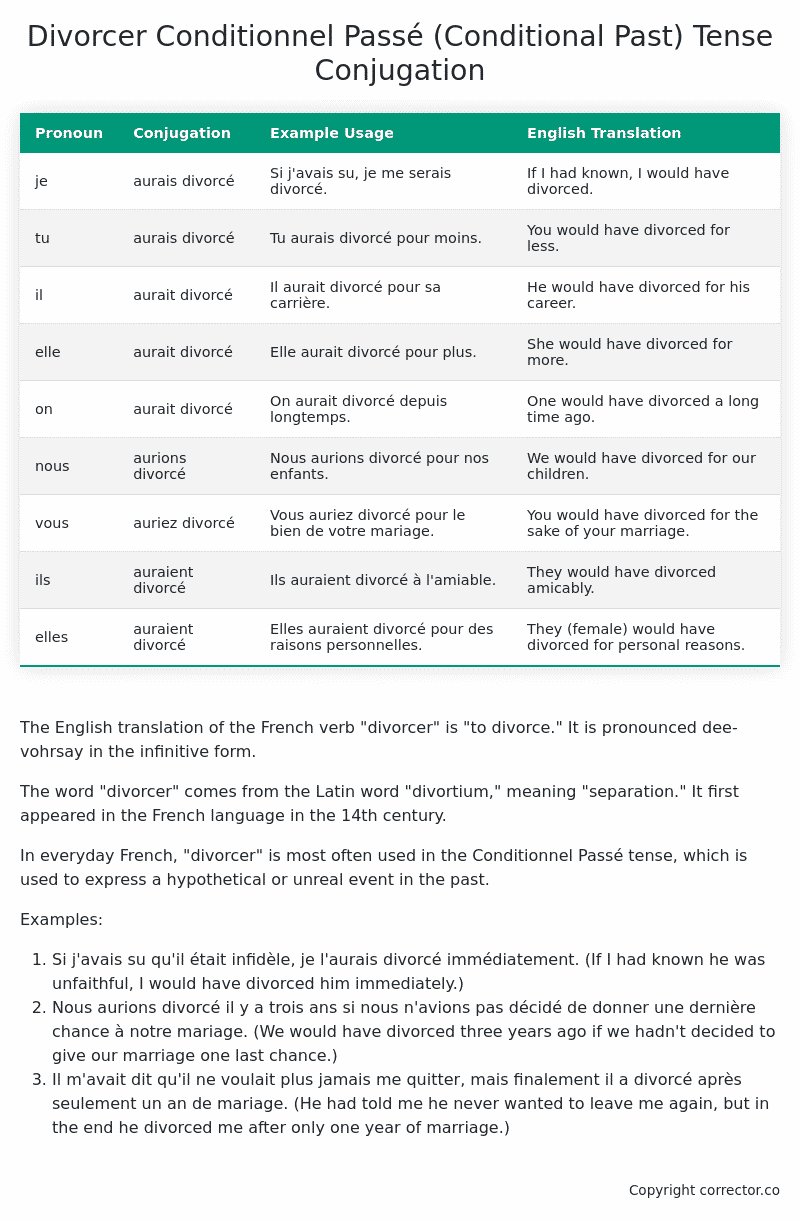Conditionnel Passé (Conditional Past) Tense Conjugation of the French Verb divorcer
Introduction to the verb divorcer
The English translation of the French verb “divorcer” is “to divorce.” It is pronounced dee-vohrsay in the infinitive form.
The word “divorcer” comes from the Latin word “divortium,” meaning “separation.” It first appeared in the French language in the 14th century.
In everyday French, “divorcer” is most often used in the Conditionnel Passé tense, which is used to express a hypothetical or unreal event in the past.
Examples:
- Si j’avais su qu’il était infidèle, je l’aurais divorcé immédiatement. (If I had known he was unfaithful, I would have divorced him immediately.)
- Nous aurions divorcé il y a trois ans si nous n’avions pas décidé de donner une dernière chance à notre mariage. (We would have divorced three years ago if we hadn’t decided to give our marriage one last chance.)
- Il m’avait dit qu’il ne voulait plus jamais me quitter, mais finalement il a divorcé après seulement un an de mariage. (He had told me he never wanted to leave me again, but in the end he divorced me after only one year of marriage.)
Table of the Conditionnel Passé (Conditional Past) Tense Conjugation of divorcer
| Pronoun | Conjugation | Example Usage | English Translation |
|---|---|---|---|
| je | aurais divorcé | Si j’avais su, je me serais divorcé. | If I had known, I would have divorced. |
| tu | aurais divorcé | Tu aurais divorcé pour moins. | You would have divorced for less. |
| il | aurait divorcé | Il aurait divorcé pour sa carrière. | He would have divorced for his career. |
| elle | aurait divorcé | Elle aurait divorcé pour plus. | She would have divorced for more. |
| on | aurait divorcé | On aurait divorcé depuis longtemps. | One would have divorced a long time ago. |
| nous | aurions divorcé | Nous aurions divorcé pour nos enfants. | We would have divorced for our children. |
| vous | auriez divorcé | Vous auriez divorcé pour le bien de votre mariage. | You would have divorced for the sake of your marriage. |
| ils | auraient divorcé | Ils auraient divorcé à l’amiable. | They would have divorced amicably. |
| elles | auraient divorcé | Elles auraient divorcé pour des raisons personnelles. | They (female) would have divorced for personal reasons. |
Other Conjugations for Divorcer.
Le Present (Present Tense) Conjugation of the French Verb divorcer
Imparfait (Imperfect) Tense Conjugation of the French Verb divorcer
Passé Simple (Simple Past) Tense Conjugation of the French Verb divorcer
Passé Composé (Present Perfect) Tense Conjugation of the French Verb divorcer
Futur Simple (Simple Future) Tense Conjugation of the French Verb divorcer
Futur Proche (Near Future) Tense Conjugation of the French Verb divorcer
Plus-que-parfait (Pluperfect) Tense Conjugation of the French Verb divorcer
Passé Antérieur (Past Anterior) Tense Conjugation of the French Verb divorcer
Futur Antérieur (Future Anterior) Tense Conjugation of the French Verb divorcer
Subjonctif Présent (Subjunctive Present) Tense Conjugation of the French Verb divorcer
Subjonctif Passé (Subjunctive Past) Tense Conjugation of the French Verb divorcer
Subjonctif Imparfait (Subjunctive Imperfect) Tense Conjugation of the French Verb divorcer
Subjonctif Plus-que-parfait (Subjunctive Pluperfect) Tense Conjugation of the French Verb divorcer
Conditionnel Présent (Conditional Present) Tense Conjugation of the French Verb divorcer
Conditionnel Passé (Conditional Past) Tense Conjugation of the French Verb divorcer (this article)
L’impératif Présent (Imperative Present) Tense Conjugation of the French Verb divorcer
L’infinitif Présent (Infinitive Present) Tense Conjugation of the French Verb divorcer
Struggling with French verbs or the language in general? Why not use our free French Grammar Checker – no registration required!
Get a FREE Download Study Sheet of this Conjugation 🔥
Simply right click the image below, click “save image” and get your free reference for the divorcer Conditionnel Passé tense conjugation!

Divorcer – About the French Conditionnel Passé (Conditional Past) Tense
Formation
Common Everyday Usage Patterns
Expressing Unreal Past Scenarios
Polite Requests or Suggestions
Expressing Doubt or Uncertainty
Interactions with Other Tenses
Conditional Present
Indicative Past Tenses
Conditional Future
Summary
Want More?
I hope you enjoyed this article on the verb divorcer. Still in a learning mood? Check out another TOTALLY random French verb conjugation!


